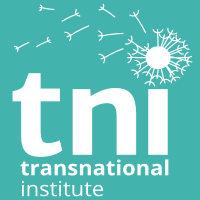Location
The Transnational Institute (TNI) is an international research and advocacy institute committed to building a just, democratic and sustainable world. For more than 40 years, TNI has served as a unique nexus between social movements, engaged scholars and policy makers.
The Transnational Institute (TNI) is an international research and advocacy institute committed to building a just, democratic and sustainable world.
Founded in 1974 as a network of ‘activist scholars’, TNI continues to be a unique nexus between social movements, engaged scholars and policy makers.
TNI has gained an international reputation for carrying out well researched and radical critiques and anticipating and producing informed work on key issues long before they become mainstream concerns, for example, our work on food and hunger, third world debt, transnational corporations, trade, and carbon trading.
As a non-sectarian institute, TNI has also consistently advocated alternatives that are both just and pragmatic, for example developing alternative approaches to international drugs policy and providing support for the practical detailed work of public water services reform.
TNI's Projects
TNI works on a wide range of interlinking issues. The constant interaction between fellows and projects gives TNI a unique, broad and informed perspective and enables a cross-disciplinary approach to complex global problems.
TNI's work currently includes:
- Leadership as a respected global voice on drugs policy, promoting a pragmatic approach to tackling illegal drugs based on harm reduction principles.
- Supporting a dynamic international network involved in building participatory, public sector water as the best way to achieve the goal of water for all
- Confronting the dogma of trade liberalisation, which like financial liberalisation has led to increased inequality, and helping to construct regional alternatives, such as the Bolivarian Alternative for the Americas, based on regional cooperation and solidarity
- Analysing and exposing the democratic dangers posed by the concentration of corporate power and proposing new legal frameworks of accountability for transnational corporations.
- Engaging with democratic innovations and experiments undertaken by social movements, progressive political parties and governments worldwide helping to empower communities to gain control over their lives and environment
- Drawing together and analysing the links between the different elements of the systemic crisis —financial, environmental and social.
Members:
Resources
Displaying 26 - 30 of 53Land deals in Laos: First insights from a new nationwide initiative to assess the quality of investments in land
In Laos land concessions have increased dramatically over the last decade. To provide a window into the concessions landscape, we conducted a nationwide inventory between 2007 and 2011. In response to an order by the Lao Government to its ministries, we developed a methodology to update the inventory and complement existing data with a systematic assessment of investment quality in 2014. We investigated aspects of compliance as well as impacts on livelihoods and the environment.
Authoritarian resource governance and emerging peasant resistance in the context of Sino-Vietnamese Tree Plantations, Southeastern Laos
Over the past decade, Laos has experienced a land rush by foreign investors seeking to gain large tracts of land for hydropower, mining, and plantation projects. The rapid pace of the phenomenon has prompted signif icant concern by international observers, Lao civil society, and certain sections of the government, regarding the impacts upon farmers that are dispossessed of their land and communal resources. However, both investors and peasant communities alike have differing experiences with the investment process.
Land concessions and rural youth in southern Laos
Scholars have produced valuable insights on the question of recent “land grabbing” in the global South. They have, however, insufficiently studied the issue from below, particularly from the point of view of a crucial group in the land conundrum: the rural youth. This paper brings to the fore the perspectives of Laotian rural youngsters amidst a hasty agrarian transition, in which the borisat (company) –in the form of large monoculture plantations– has permeated both the physical landscape and the daily narratives of people.
Allocation or appropriation? How spatial and temporal fragmentation of land allocation policies facilitates land grabbing in Northern Laos
The Lao Land and Forest Allocation Policy (LFAP) was intended to provide clearer property rights for swidden farmers living in mountainous areas. These lands are legally defined as “State” forests but are under various forms of customary tenure. The policy involves demarcating village territorial boundaries, ecological zoning of lands within village territories, and finally allocating a limited number of individual land parcels to specific households for farming.
The Meaning of Land in Myanmar
Contents:
What is land and why is it important? ...
Why is land such a burning issue in Myanmar? ...
How is land related to debates about development?...
Is there a human right to land?...
What steps are people in Myanmar taking to
express and assert their human right to land?



